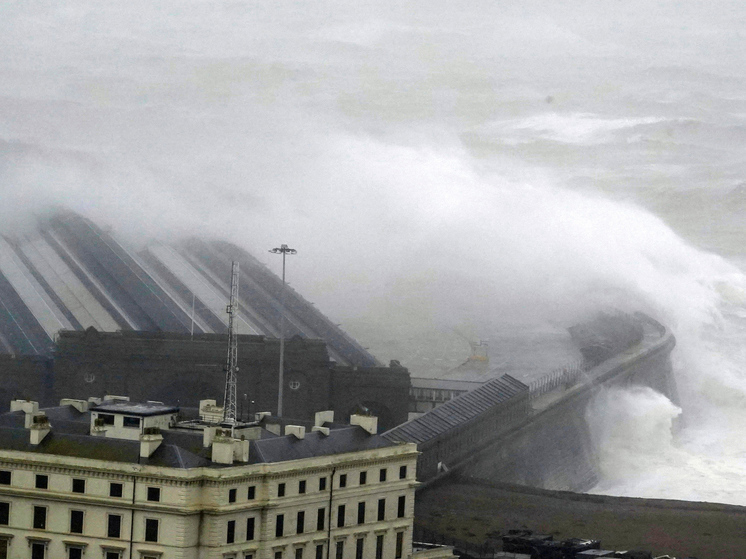A record low pressure was recorded in England
The storm “Ciaran” that hit the UK was in earnest in its fury: residents were forced to evacuate their homes and seek refuge in hotels. Wind gusts of 167 km per hour shatter windows and rip roofs off houses — while waves wash cars out to sea and cause travel chaos.

Britons awoke on Thursday to the fury of Storm Ciaran, with 104mph winds ripping roofs off houses, shattering windows and sending commuters out of harm's way urged to avoid travel and work from home.< /p>
The windshields of two buses were blown out by strong winds brought by Storm Ciaran. The buses were traveling to Capel-le-Ferne near Folkestone, Kent, at the time of the incident, Sky News reported.
The Met Office says there is a «yellow» wind warning across Britain, meaning flying debris may pose a danger to life and possible damage to buildings.
In Lansing, West Sussex, emergency services crews brought in 1,400 tonnes of pebbles to help «protect local homes», the Environment Agency said. The pebbles absorb wave energy by moving as the waves hit the beach, slowing them down before they hit the sea wall.
After Storm Ciarán underwent explosive cyclogenesis — where central pressure drops by 24 mb or more in 24 hours — it reached a low of about 952 mb. This is the lowest pressure ever observed in England in November, Sky News notes. “This low pressure,” the channel explains, “means the boiling point of water will drop by about a degree, so you may notice your kettle boiling a little faster — but will your cup of tea taste as good?”
According to the Daily Mail, the “weather bomb” led to dozens of people being forced to flee their homes on the island of Jersey, 35 people were forced to spend the night in a refugee hotel, while three were taken to hospital with injuries.< /p>
Meanwhile, thousands of students across Britain's south coast were returned to COVID-style remote learning as hundreds of schools closed for the day.
As Storm Amber hit the UK early on Thursday morning With strong winds and heavy rain, flooding is expected, especially along the south coast, and «risk to life» warnings are in place. More than 8,500 homes were without power in Cornwall on Thursday morning.
The Channel Islands in the English Channel are facing their worst storm yet, Ciaran. Jersey Police said: «As of this evening, 29 adults, 6 children and 7 pets have been relocated to hotels due to property damage. Four people and a cat have been relocated and three people have been taken to hospital by emergency medical services.» Horrific scenes of destruction were seen on the island: roof tiles were smashed to the ground and garden furniture was overturned.
Shocking baby monitor footage shows the horrific moment a mother and her sleeping baby were awakened by a hurricane crashing through her window and clinging to their baby as they ran out of the room.
Three-inchers were also reported hailstones that fall after a strike of thunder and lightning. All flights from Jersey, Guernsey and Alderney airports have been cancelled.
Schools in Hampshire, Devon, Dorset and Cornwall are among those forced to close, with thousands of pupils being returned to remote learning due to dangerous conditions.
Meanwhile, commuters have been warned that they should not try to get to offices due to huge delays on large parts of the railway network due to the risk of fallen trees and debris on the tracks.
At Hastings, a wind-blown trampoline fell onto the line, causing railway operators have warned people to tie down their outdoor furniture.
Southern Rail said: «If you are planning to travel on routes starting on or around the South Coast today, you should carefully consider whether your journey is necessary. You should work from home if you can. There is a high risk that Fallen trees and debris will be blown onto the train tracks and significant service disruptions are possible Thursday morning.”
Across the Channel in France, a person has died after the country was hit by a storm with winds of up to 128 mph. Transport Minister Clement Beaune said a truck driver was killed when a tree fell on his vehicle in the Aisne region.
P&O has canceled its ferry services between Dover and Calais due to the impact of the storm. There were long queues on the A20 as HGVs queued to enter the ferry terminal.
People are also being advised to stay away from coastal paths and promenades due to fears of 35ft waves may wash them out to sea. In Brighton, sea foam caused by ferocious waves blanketed beach cabins on Thursday night and a few brave walkers faced strong winds.
On the Isle of Wight, dozens of homes were also left without power, with several roads closed due to flooding . Repair crews were desperately trying to repair damaged power lines.
Forecasters predicted wind gusts of up to 80 miles per hour, and coastal residents were encouraged to use sandbags to shore up their properties.


